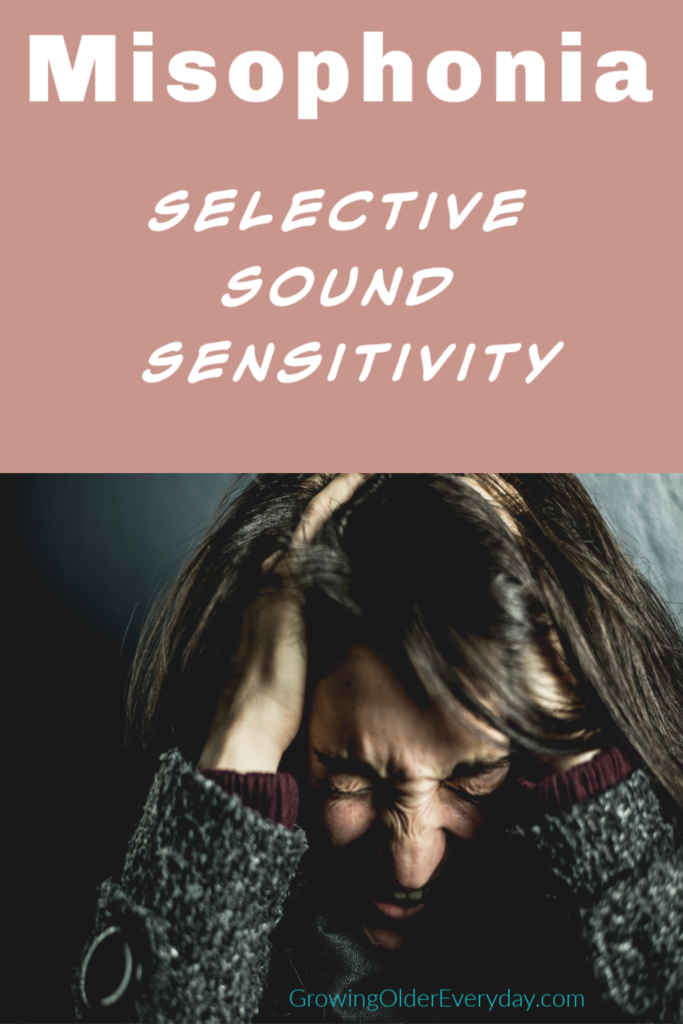
In my mid to late fifties, I struggled with a medical condition that just seemed crazy. No one else had it, so it was hard to explain and sympathy wasn’t given to me. I watched 20/20, one evening in 2011 and saw Kelly Ripa describing exactly what I was feeling. The irritation with sounds that to most people went unnoticed. If I was in a meeting, with someone clicking their pen, I would stop their hand, if I was close enough. Otherwise, I became panicky and wanted to run away, or scream at them, which was socially unacceptable.
What was I to do? I pretty much self-diagnosed myself, but really didn’t know where to go from there. So I got an appointment to see a physician in the head and neck surgery department of my medical group. Honestly, I went there expecting that there was no one in my medical group that knew anything about this, since I had never heard of it.
My doctor was super nice and he knew all about misophonia. He diagnosed me as having it. I wasn’t crazy after all. At that time there was no effective medical treatment. I explained that at my job, they had no sympathy for me and my requests. I left there with a feeling of hope, because he gave me an official letter that said “she has been diagnosed with a medical condition known as misophonia (also known as selective sound sensitivity.) Individuals with misophonia develop an intense emotional reaction (negative) to common everyday noises (e.g. people whispering, chewing, pen clicking, music, coughing, etc.) Even the most ordinary or quiet noises can be extremely uncomfortable and socially debilitating.”
That summed up my life. If someone was playing music in a faraway office, I could hear it. No one believed me, because they couldn’t hear it. Conscientious people tried to be nice in my cubicle area, by choosing to whisper, in hopes of not bothering the rest of us. That was worse for me but great for everyone else. The pen clicking really drove me crazy. But no one understood, because I, alone in the office, had this debilitating problem. Was I a freak, who needed to retire?
Bringing my letter to human resources at work wasn’t the answer I had hoped for, even though my doctor specifically said: “please consider ways to accommodate her at work.” I even shared the video from the 20/20 episode with a few employees. The human resources manager hadn’t listened to it a few weeks after I sent it to her. I wasn’t important enough to be taken seriously, I guess. Some employees tried. They didn’t understand how bad it was for me, so they didn’t succeed for the most part.
One person, in particular, took offense when I would close the door of her office to prevent hearing the sounds, that drove me crazy. She wasn’t sympathetic to my condition and refused to try, in any way, to accommodate me. The help I sought, didn’t really come through with my doctor’s note. In everyone’s mind, it seemed to be that it was too much of a sacrifice to them, to conform their lives to my “disability.”
My next job was much better. I stopped a lot of pen clicking in our department staff meetings, but at least they tried to accommodate me. And they did show me compassion.
So, if there is something that you don’t understand about your body, I strongly urge you to go to the doctor until you find an answer. There is no guarantee that there will be a cure. Or that anyone will understand. But at least you will have the peace of mind that there are others out there with the same condition, who know what you are going through. You are not alone in this world. You shouldn’t have to feel like an outcast.
Since my diagnosis, there are now some treatments. Cognitive-behavioral therapy is one of them. It sounds like they attempt to teach you to be more accepting of the sounds that bother you. I’ve never tried it and I don’t plan to at this time. I try to stay away from situations that will bother me. I walk away at times. And I think after my husband seemed to think I was ridiculous, he has mostly tried to not upset me. I just wish he would make it so that every letter he types in his cell phone, didn’t make that very quiet tap noise. There is a setting for that.
The really unbelievable thing about misophonia is that I can sit here and type on my keyboard, making noises that, if someone else did, it would drive me bonkers, but it doesn’t bother me when I do it. I think it has to do with the fact that I control the sound and I know it will end and I can end it if it were to bother me.
If you never have a diagnosis of misophonia, be thankful. About 20% of us have misophonia, and females have it more often than males. If you know someone that has it, do everything you can to accommodate them. Their suffering is real. Be the one that is compassionate, not the one that laughs at their “foolishness.”
[mc4wp_form id=”393″]